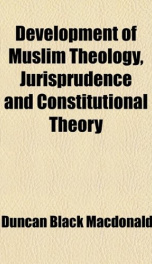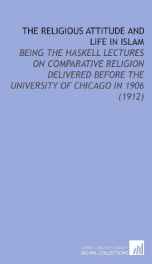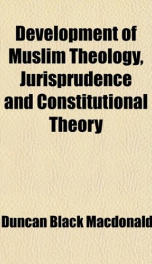development of muslim theology jurisprudence and constitutional theory

Purchase of this book includes free trial access to www.million-books.com where you can read more than a million books for free. This is an OCR edition with typos. Excerpt from book: CHAPTER III The problem of the Abbasids; the House of Barmak ; the crumbling of the empire; the Praetorians of Baghdad; the Buway- hids; the situation of the Khalifa under them; the Saljuqs; the possibilities of development under them; the Mongols and the Abbasid end; the Egyptian Abbasids; the Ottoman Sultans, their heirs; theory of the Khalifate; the modern situation; the signs of sovereignty for Muslims; five grounds of the claim of the Ottoman Sultan; the consequences for the Sultan; other Muslim constitutions; the Shi'ites; the Ibadites; the Wahha- bites; the Brotherhood of as-Sanusi. We must now return to the Abbasids, whose empire we left crumbling away. It was a shrewd stroke of policy on the part of its founder to put the new capital, Baghdad, on the Tigris, right between Persia, Syria and Arabia. For the only hope of permanence to the empire lay in welding these into a unity. For a short time, in the hands of the first vigorous rulers, and, especially, during fifty years of guidance by the House of BarmakPersians who flung in their lot with the Abbasids and were their stay till the madness of Harun ar-Rashid cast them down this seemed to be succeeding; but, just as the empire of Charlemagne melted under his sons, so did the empire of al-Mansur and al-Ma'mun. The Bed- awi tribes fell back into the desert and to the free chaos of the old pre-Islamic life. As the great philosophical historian, Ibn Khaldun, has remarked, the Arabs by their nature are incapable of founding an CRUMBLING OF HE EMPIRE empire except when united by religious enthusiasm, and are of all peoples least capable of governing an empire when founded. After the first Abbasids, it is, a fatal error to view the Muslim dynasties as Arab or to speak of the Muslim civilization as Arabian. i The co...
Info about the book
Author:
Series:
Unknown
ASIN:
B004IP18IG
Rating:
3/5 (5)Your rating:
0/5
Languge:
English
Users who have this book
Users who want this book
What readers are saying
What do you think? Write your own comment on this book!
write a commentif you like development of muslim theology jurisprudence and constitutional theory try:
Other books by this author
Do you want to exchange books? It’s EASY!
Get registered and find other users who want to give their favourite books to good hands!





